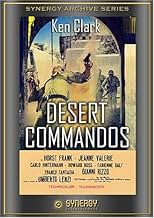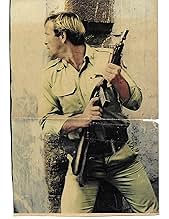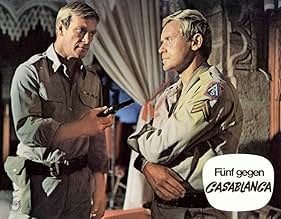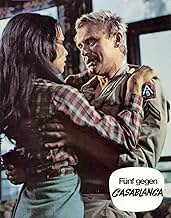IMDb RATING
5.1/10
450
YOUR RATING
German commandos are dropped behind enemy lines in the Sahara Desert and tasked with getting to Casablanca to assassinate Allied leaders.German commandos are dropped behind enemy lines in the Sahara Desert and tasked with getting to Casablanca to assassinate Allied leaders.German commandos are dropped behind enemy lines in the Sahara Desert and tasked with getting to Casablanca to assassinate Allied leaders.
Featured reviews
Italian director Umberto Lenzi, who went on to bring audiences across the globe epic schlock in "The Greatest Battle" and incredibly cheap thrills in "Bridge to Hell" begins his career in the war genre with a slam-bang suspense piece which proves to be, undoubtedly, one of the best war movies to come out of Italy in the 1960s.
The story is fresh and original, and presented with unique twists from beginning to end. Five German soldiers are parachuted into North Africa, and will trek to Casablanca to assassinate a conference of Churchill, Roosevelt and DeGaulle.
Lenzi's film is a true example of character-driven drama at its best. Ken Clark is Captain Schoeller, leader of the unit, and he's never less than totally convincing as a die-hard advocate of Hitler and Nazism. Horst Frank ("Thunder from the West") plays Lt. Wolf with gusto and conviction. Wolf's mother is American and his best friend is a Jew, so he and Schoeller don't see eye-to-eye. He and Schoeller clash over opposing ideals several times. Despite their dissension, both are dedicated soldiers who have a job to get done, and grudgingly work together to accomplish the mission. Lenzi never strays far from this central conflict of ideals, always keeping his message clearly in focus.
The supporting cast of familiar European actors is excellent all-around. Carlo Hintermann, Hardy Reychelt and Howard Ross round out the German team. Hintermann makes the most of his little role as a tough, dedicated German Sergeant, a career soldier who'll do what he's told when he's told, no questions asked. Jeanne Valerie and Fabienne Dali are two female characters, whose motives are never clearly defined until the film's third act and that's when you realize whose side each is really on. Gianni Rizzo has a few brief scenes as a French informer, working with the Germans, and gets to do blast away at American soldiers with a machinegun in one of the film's nail-biting action scenes. Be sure to watch for Tom Felleghy ("The Greatest Battle"), John Stacy ("Battle of the Commandos"), and Franco Fantasia ("Adios, Sabata") in small, yet key roles as Allied officers.
Though the action-packed footage is scant, what's here is brilliantly edited and directed. The third act is tense and fast-paced, as the German "heroes" dodge bullets across rooftops and duck through alleyways as American MPs are in hot pursuit. The final infiltration of Churchill's banqueting hall is excellently set up, with frustratingly deliberate pacing, which will leave you on the edge of your seat. This climax ends abruptly with a great surprise, causing your jaw to drop as you wonder "What just happened ?" Two aspects of film-making that Lenzi and his crew seem to emphasize are the sets and landscapes. There is not one shot in this movie that looks out of place. When the German officers talk in headquarters, the interior looks like an office in a German headquarters. The film is set in the desert, and there are constant wide shots as actors speak and walk which reveal that these scenes were actually shot in the vast Egyptian sand dunes. The oasis of Kuffran looks especially bustling, and the essence of the atmosphere of Casablanca during wartime is superbly captured. During this time period, many directors fell back on shabby interiors and shot in outdoor locations which looked completely wrong. For example, "Commando Attack", also shot in 1967, was lensed in Spain and exteriors were passed off as "southern France", yet it's clearly visible the action was not occurring in the French countryside.
Finally, there are a number of other little details which contribute to this film's success: fine editing and camera-work give this movie a very professional look and feel; it always looks professional. Lenzi is just starting to develop his style, and his signature close-ups are used in moderation, but mean all the more when they are used. There are some great crane shots and wide shots used to establish the scope of the sets, most notably in the scenes set in Casablanca.
This is definitely a great film, with some strongly developed internal conflicts and fleshed-out characters. The quality of Lenzi's films would degenerate as the years passed, but "Desert Commando" is easily one of the best war films to come out of 1967, ranking right up there with "The Dirty Dozen".
7/10
The story is fresh and original, and presented with unique twists from beginning to end. Five German soldiers are parachuted into North Africa, and will trek to Casablanca to assassinate a conference of Churchill, Roosevelt and DeGaulle.
Lenzi's film is a true example of character-driven drama at its best. Ken Clark is Captain Schoeller, leader of the unit, and he's never less than totally convincing as a die-hard advocate of Hitler and Nazism. Horst Frank ("Thunder from the West") plays Lt. Wolf with gusto and conviction. Wolf's mother is American and his best friend is a Jew, so he and Schoeller don't see eye-to-eye. He and Schoeller clash over opposing ideals several times. Despite their dissension, both are dedicated soldiers who have a job to get done, and grudgingly work together to accomplish the mission. Lenzi never strays far from this central conflict of ideals, always keeping his message clearly in focus.
The supporting cast of familiar European actors is excellent all-around. Carlo Hintermann, Hardy Reychelt and Howard Ross round out the German team. Hintermann makes the most of his little role as a tough, dedicated German Sergeant, a career soldier who'll do what he's told when he's told, no questions asked. Jeanne Valerie and Fabienne Dali are two female characters, whose motives are never clearly defined until the film's third act and that's when you realize whose side each is really on. Gianni Rizzo has a few brief scenes as a French informer, working with the Germans, and gets to do blast away at American soldiers with a machinegun in one of the film's nail-biting action scenes. Be sure to watch for Tom Felleghy ("The Greatest Battle"), John Stacy ("Battle of the Commandos"), and Franco Fantasia ("Adios, Sabata") in small, yet key roles as Allied officers.
Though the action-packed footage is scant, what's here is brilliantly edited and directed. The third act is tense and fast-paced, as the German "heroes" dodge bullets across rooftops and duck through alleyways as American MPs are in hot pursuit. The final infiltration of Churchill's banqueting hall is excellently set up, with frustratingly deliberate pacing, which will leave you on the edge of your seat. This climax ends abruptly with a great surprise, causing your jaw to drop as you wonder "What just happened ?" Two aspects of film-making that Lenzi and his crew seem to emphasize are the sets and landscapes. There is not one shot in this movie that looks out of place. When the German officers talk in headquarters, the interior looks like an office in a German headquarters. The film is set in the desert, and there are constant wide shots as actors speak and walk which reveal that these scenes were actually shot in the vast Egyptian sand dunes. The oasis of Kuffran looks especially bustling, and the essence of the atmosphere of Casablanca during wartime is superbly captured. During this time period, many directors fell back on shabby interiors and shot in outdoor locations which looked completely wrong. For example, "Commando Attack", also shot in 1967, was lensed in Spain and exteriors were passed off as "southern France", yet it's clearly visible the action was not occurring in the French countryside.
Finally, there are a number of other little details which contribute to this film's success: fine editing and camera-work give this movie a very professional look and feel; it always looks professional. Lenzi is just starting to develop his style, and his signature close-ups are used in moderation, but mean all the more when they are used. There are some great crane shots and wide shots used to establish the scope of the sets, most notably in the scenes set in Casablanca.
This is definitely a great film, with some strongly developed internal conflicts and fleshed-out characters. The quality of Lenzi's films would degenerate as the years passed, but "Desert Commando" is easily one of the best war films to come out of 1967, ranking right up there with "The Dirty Dozen".
7/10
Sometimes tense Euro-war movie in a similar vein to "The Guns of Navarone" has brawny Ken Clark (familiar from the Peplum genre) leading four of the Nazi's finest into North Africa where they attempt an audacious plan to assassinate not one, but three Allied Forces leaders, namely Churchill, Stalin and Roosevelt present in Casablanca for a summit. As it turns out, they'll have to settle for De Gaulle substituting for Stalin, nevertheless their epic hunt behind enemy lines is an expansive mission leading them to the brink, encountering cross and double cross around every corner.
Solid cast includes Horst Frank as an American-born Nazi commando, whose commitment to the Feuhrer wanes in the face of the desperate mission and 'immoral' sacrifices taken to improve its chance of success, future Italian leading man Howard Ross in a small role, and pleasantly, gender balance achieved with beauties Jeanne Valeri playing an Arab guide, and Fabienne Dali as a turncoat who may or may not be in cahoots with the Allies.
Italian horror master Umberto Lenzi is better known for his Cannibal capers, but demonstrates a universal talent in bringing together this B-Italian action film with moderate suspense, light humour and at least some semblance of depth in characterisations despite the clichés. Probably not for the average GI Joe, but if you're comfortable with Euro style then you should enjoy this mission to Morocco.
Solid cast includes Horst Frank as an American-born Nazi commando, whose commitment to the Feuhrer wanes in the face of the desperate mission and 'immoral' sacrifices taken to improve its chance of success, future Italian leading man Howard Ross in a small role, and pleasantly, gender balance achieved with beauties Jeanne Valeri playing an Arab guide, and Fabienne Dali as a turncoat who may or may not be in cahoots with the Allies.
Italian horror master Umberto Lenzi is better known for his Cannibal capers, but demonstrates a universal talent in bringing together this B-Italian action film with moderate suspense, light humour and at least some semblance of depth in characterisations despite the clichés. Probably not for the average GI Joe, but if you're comfortable with Euro style then you should enjoy this mission to Morocco.
Five German commandos are parachuted into the Sahara desert, and must make their way to Casablanca, where Churchill, Roosevelt, and Stalin are holding a top-secret meeting. Then, they must kill them! This film is quite bizarre; but it contains alot of action-packed scenes and some good suspense. Worth a good viewing.
Umberto Lenzi's DIRTY DOZEN-style WW2 movie DESERT COMMANDOS follows a squad of Nazi soldiers who are tasked with being dropped behind enemy lines and assassinating the three Allied leaders Roosevelt, Churchill and Stalin who are due to meet in secret. That sounds pretty interesting, and makes this seem like a precursor to the Jack Higgins adaptation THE EAGLE HAS LANDED, but in reality DESERT COMMANDOS is nothing more than a bog standard desert-trotting B-movie with references to better films like ICE COLD IN ALEX. The cast is headed by the unremarkable Ken Clark, and the only one who makes a mark is Horst Frank as the most fleshed out of the group. The film moves along with a mix of genre elements, but none of the action is outstanding and the only suspense is generated at the admittedly exciting climax.
Splendid plot idea, but a little more work on it might have made the difference: some scenes are just too simplistic; when they enter the house of the French officer's mistress, it doesn't ring "true". The desert scenes are nice but a little more camera and light work might have made them beautiful. WW II movie directors who use modern hardware are killing me: for obvious financial reasons, he probably rented the equipment on the site from the Moroccan army: the aircraft, a Max Holste Broussard, was designed in the fifties; there wasn't a single WWII vintage tank: they were either Creusot-Loire AMX-13 or Panhard armored vehicles, designed in the fifties. It's a pity.
Did you know
- TriviaWhen they land by parachute, one still has a chute on his back that has not been deployed.
- GoofsThe uniforms worn by the German troops, US troops and the Moroccan police, as well as the British uniforms worn by the Germans, are more modern than the 1942 setting.
- ConnectionsEdited into WW II Theater: Desert Command (2022)
- SoundtracksSilent Night
Written by Franz Xaver Gruber and Joseph Mohr
Sung, in German, at Schöller's Berlin home.
Details
- Runtime
- 1h 36m(96 min)
- Aspect ratio
- 2.35 : 1
Contribute to this page
Suggest an edit or add missing content






























